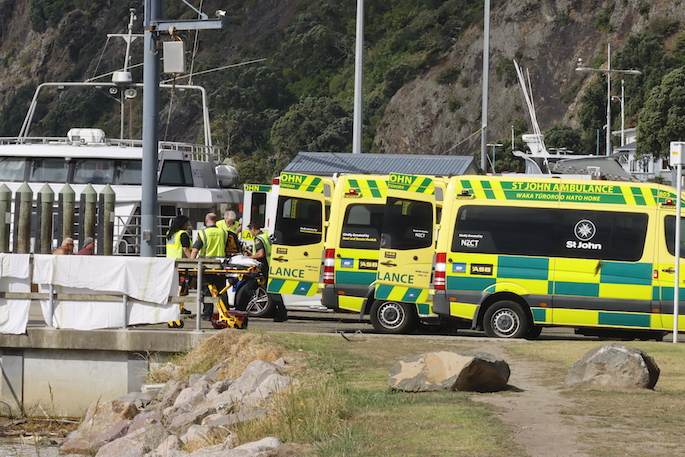'What we were faced with on Monday was beyond comprehension.”
This is what Whakatāne Hospital clinical leader and consultant anaesthetist Dr Heike Hundemer says when talking about the events that followed the fatal White Island eruption.
White Island erupted at 2.11pm on Monday, December 9, while 47 people were on the island for a guided tour.
So far, eight people have died and another eight are still missing on the island. Three people have been discharged from hospital and the remainder remain in hospital with various levels of injuries.
'We first got the call from police as well as multiple calls from our local contacts – we are a small tight community,” says Heike.
'Like all hospitals our team holds mass casualty training exercises. We had one recently in our Emergency Department involving junior and senior doctors, nurses and St Johns. But what we were faced with on Monday was beyond comprehension.”
Whakatāne Hospital activated their Mass Casualty Plan, which means staff from across the hospital made their way as fast as possible to the Emergency Department.
The Mass Casualty Plan also triggered a wider response for additional staff to get there from across the BOP.
'Normally on a typical day in our Emergency Department, we would have about six nurses and two doctors on duty.
'On Monday, once we knew the extent and severity of the casualties, I think there would have been about 100 staff in our Emergency Department, Acute Care Unit and theatres. We used every single bed space, every resource we had to care for those people.
'To put this in perspective, if we saw one patient with the severity of burns that we treated that day, this would have been a significant event for our small hospital and would have activated our trauma team. Monday is beyond anything we would have anticipated.”
Heike has worked in major centres in Germany as well as New Zealand, and says he has never seen this number of critically injured patients coming into an Emergency Department in a short space of time.
'Our staff are deeply impacted by what they saw. We are a tight team, in a small community some of those people who have lost their lives were known to our staff.
'It's important to me to give some comfort to every patient I treated that day. I told them they were in good hands with a professional team.
'We are professionals and compassionate people, those people we treated and comforted will forever stay in our minds.
'Our thoughts are with them, we feel for them, their families and friends.”
David van Dijk is Whakatāne Hospital's coordinator and a duty nurse manager.
What he saw on Monday 'was devastating”.
'I've been a registered nurse for the past 22 years working for many of those years in emergency departments in NZ and the UK. What I experienced three days ago was devastating.
'At the heart of our hospital are our people. They all rose to the needs of our community and worked beyond what anyone would expect of them.
'The entire hospital was involved in responding to the tragic event that we were faced with.
'As well as doctors and nurses we had occupational therapists, physiotherapists, social workers, podiatrist, radiographers, Regional Māori Health, staff from Public Health, stores, kitchen, admin, orderlies, security, facilities, engineers, cleaners and volunteers – all came together to do what they could. It was all hands on deck.
'We're extremely grateful for the support we received from GPs and health professionals in the community – when they heard what had happened they came to the hospital with their skills and knowledge ready to help wherever they could,” says David.
'I want to acknowledge the support that we've received from colleagues in DHBs around the country – your kindness and generosity has meant a lot to us at this time.
'I couldn't be more proud of how our hospital and wider community came together to do what we could for those people. Like Heike said, the compassion shown by our team faced with this catastrophe was always there and still is.
'For many of us, it feels surreal. Everyone deals with tragic events in their own way, many of us are still coming to terms with what happened.”
Bay of Plenty District Health Board interim chief executive Simon Everitt says he has heard so many stories about the amazing response from the wider health team to manage 31 patients, all at once.
'We had staff from across the health system, including Allied Health, Toi Te Ora Public Health), Clinicians from all other Departments, Administration, Security, Pharmacy, Orderlies, General Practice, Iwi Providers, Regional Māori Health and many other departments, all came together to support the efforts in the Emergency Department and Acute Care Unit. We also had two car loads of Tauranga clinicians come through to support their colleagues.
'At one stage it was estimated there were about 100 people assisting in the trauma response.
'This is truly an extraordinary example of team work.”
He says the staff of Whakatāne Hospital did an incredible job as they received the severe trauma patients, and swiftly went about their jobs of triaging, calming, consoling, diagnosing, and starting treatment on injuries that before Monday they had possibly not experienced.”



0 comments
Leave a Comment
You must be logged in to make a comment.